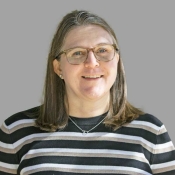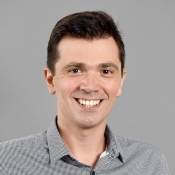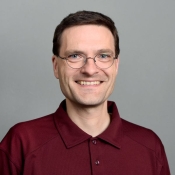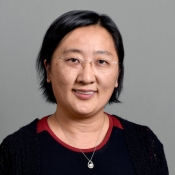Fulton Schools introduces 4 new associate deans
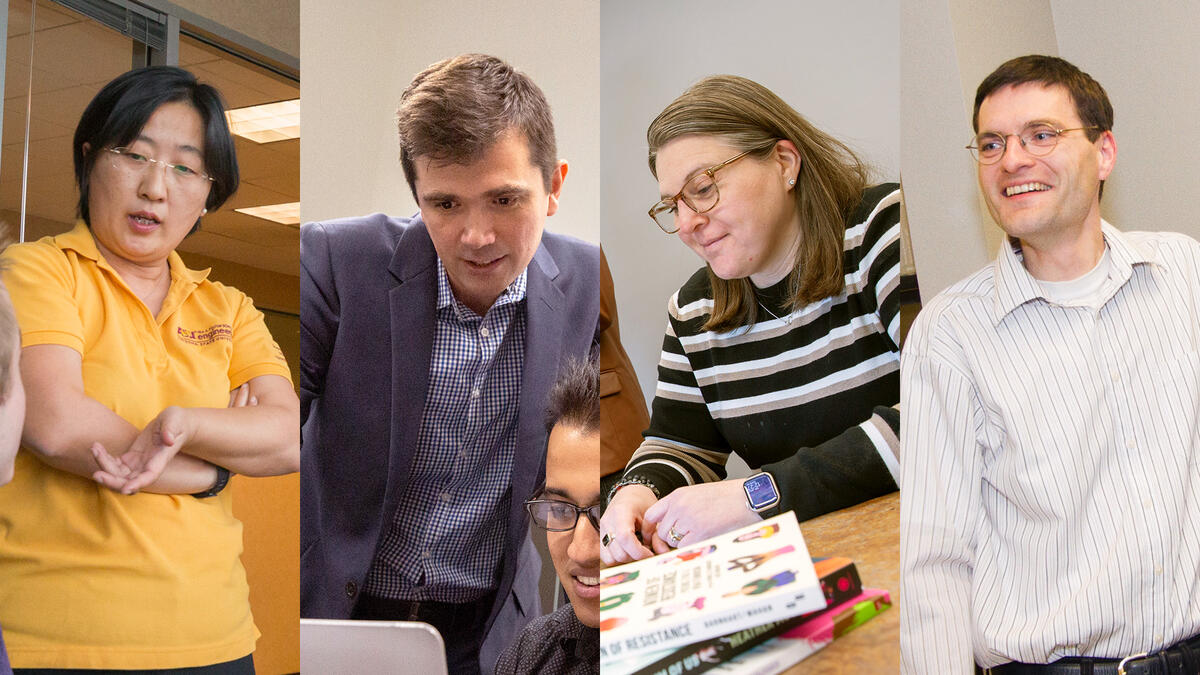
The new associate deans are (above, from left) Teresa Wu, associate dean of global engagement; Visar Berisha, associate dean of research commercialization; Jennifer Bekki, associate dean of inclusive excellence; and Michael Goryll, associate dean of undergraduate programs. Image created by Erika Gronek/ASU
The Ira A. Fulton Schools of Engineering at Arizona State University has experienced robust growth in recent years and continues to evolve to meet the needs of students and communities worldwide.
With this evolution in mind, the Fulton Schools has created four new associate dean positions. The roles provide capacity in key areas critical to advancing the Fulton Schools goals of inclusive excellence, growing the research enterprise, broadening access and global engagement.
“Creating these associate dean positions is a response to our growth and part of our positioning for future opportunities of strategic interest to both ASU and the Fulton Schools,” says Kyle Squires, dean of the Fulton Schools and ASU’s senior vice provost for engineering, computing and technology. “Through these positions, we are cultivating talent from within the community and building capacity among our talented faculty who are well positioned to step into these roles, given their institutional knowledge and experiences in many different capacities.”
The new associate deans are:
- Jennifer Bekki, associate dean of inclusive excellence and an associate professor of engineering in The Polytechnic School, part of the Fulton Schools.
- Visar Berisha, associate dean of research and commercialization and a professor of electrical engineering with a joint appointment in the School of Electrical, Computer and Energy Engineering, also part of the Fulton Schools, and ASU’s College of Health Solutions.
- Michael Goryll, associate dean of undergraduate programs and an associate professor of electrical engineering in the School of Electrical, Computer and Energy Engineering.
- Teresa Wu, associate dean of global engagement and a professor of industrial engineering in the School of Computing and Augmented Intelligence, part of the Fulton Schools.
The decision to elevate current faculty members was guided by the Fulton Schools values, one of which is to build a foundation for all to be successful, thus providing these faculty members with opportunities for continued professional growth.
“The Fulton Schools has thrived as a community owing to its focus on continuous improvement of its people, programs, processes and collaboration among highly accomplished talent to bring new ideas and innovative approaches to support a wide variety of initiatives,” Squires says. “Our values keep our efforts grounded in a shared culture that is supportive of the professional development of its community members and focused on cultivating excellence in everything that we do.”
Associate Dean of Inclusive Excellence Jennifer Bekki
Before becoming a faculty member in The Polytechnic School, Bekki earned three degrees as a Fulton Schools student. After joining the faculty, she became the inaugural chair for the Fulton Schools engineering education systems and design doctoral program, and later served as the associate director of The Polytechnic School. Bekki’s experiences matriculating through the Fulton Schools as a student and then being part of the faculty during a period of evolution and growth provide her with a unique perspective as she steps into her new role.
“My overarching goal for this position is to advance initiatives that further align the community within the Fulton Schools to an environment where faculty and staff from a broad set of social and professional identities have the support they need to feel included, valued and welcomed as their full selves,” Bekki says.
The current scope of her role includes faculty mentorship as co-director of the M360 Faculty Mentorship program, which is based on faculty recognition and general advancement of inclusive excellence for faculty and staff members within the Fulton Schools.
“In support of these initiatives, my goal is to take an action-oriented approach that incorporates findings and implications from the broad and growing body of literature focused on inequities in higher education,” she says.
In the new role, Bekki aims to support a sense of belonging and inclusion among Fulton Schools faculty members, staff and students.
“National data shows that we have decades-long, stubbornly stagnant and low representation within STEM among members of marginalized groups such as people of color and women," she says. "We can do better, and I’m excited and grateful to be able to be one part of the collective effort needed to lead the necessary changes.”
Associate Dean of Research Commercialization Visar Berisha
Berisha has had a keen interest in advancing entrepreneurial activity since early in his career as an ASU faculty member.
When he joined the Fulton Schools in 2013, his lab concentrated on developing and validating health technology for neurology applications. Two years later, he was inspired to start his own business after he learned from a National Science Foundation staff member that, on average, it takes 17 years to translate health care innovation from academic labs to the clinic.
“I was encouraged to consider entrepreneurship as a way of shortening this timeline,” Berisha says. “We participated in the NSF Innovation Corps program, which facilitates the transformation of innovation to impact.”
This led Berisha to found Aural Analytics, a technology company that analyzes speech to detect health problems.
“I felt a very different sense of accomplishment seeing our innovation influence decision-making in clinical contexts,” he says. “Our aim within the Fulton Schools is to design a framework that facilitates this journey from research to application for all faculty, streamlining the path to impactful innovation.”
Berisha’s primary objective in his new role is to further strengthen the entrepreneurial culture within the Fulton Schools and across ASU.
“This involves nurturing an entrepreneurial mindset among faculty, especially those who are early in their career, and ensuring they have the necessary support to responsibly and effectively translate their research into scalable solutions,” he says.
Being selected for this leadership role within the Fulton Schools is deeply meaningful to Berisha.
“From my beginnings at ASU, I’ve grown as an entrepreneur within the Fulton Schools ecosystem by harnessing its resources,” he says. “I am excited to use this position to further enhance and expand the entrepreneurial landscape for our faculty and researchers.”
Associate Dean of Undergraduate Programs Michael Goryll
Goryll has previously served as the electrical engineering undergraduate program chair in the School of Electrical, Computer and Energy Engineering. He played an integral role in the launch of the online delivery method of the undergraduate electrical engineering degree program.
The experience helped him develop an understanding of the structure of undergraduate curricula and inspired ideas to enhance the Fulton Schools’ undergraduate programs.
“I hope that, in my new role, I will be able to work with all other programs in the Fulton Schools to pool ideas and solicit feedback from faculty across different disciplines to implement impactful changes,” Goryll says.
He aims to help the Fulton Schools keep its undergraduate programs relevant and assist in addressing challenges individual programs face. Engineering fields are advancing at a rapid pace, and Goryll says it is important for instruction to keep up.
“We need to address the students’ needs so they can be successful — not only in our programs, but also in their future careers,” he says. “My first goal will be to find out what main issues the programs are facing and come up with potential pathways to solve them. Another goal will be to determine if there are skills students aren’t mastering before graduating that are currently not being addressed sufficiently in our curriculum.”
Goryll is honored to have been chosen for this role and is looking forward to working with all members of the Fulton Schools on innovating curricula.
“I see my role as being a facilitator and liaison between the programs and Fulton Schools leaders,” Goryll says. “I am committed to listening to input from diverse sources to cultivate student success.”
Associate Dean of Global Engagement Teresa Wu
Wu started her career as an industrial engineering faculty member at ASU in 2001 and has held several leadership roles since that time.
She served as an interim co-director for the School of Computing and Augmented Intelligence during the 2022–23 academic year. Wu is also the founding co-director of the ASU-Mayo Center for Innovative Imaging.
In her new position, one of Wu’s goals is to develop and implement the strategic vision of the Fulton Schools’ global initiatives, such as the PluS Alliance and the Cintana Alliance. She hopes to provide more opportunities for global collaboration to students and faculty.
“Global is the key word,” Wu says. “In the Fulton Schools, we already have a globally connected network of higher education institutions, government entities and industry. Coordinated global engagement efforts are important to further advance student success, expand international collaboration, enhance innovations and more.”
She plans to promote the Fulton Schools as an international leader through strategic planning that connects students in the U.S. and abroad to innovative engineering education opportunities.
Wu aims to create a flexible curriculum with a modular design to improve engineering education quality and access. She also envisions partnerships with international governments to create pathways to ASU for undergraduate and graduate students from around the world.
Additionally, Wu looks to engage the global community of Fulton Schools alumni to increase name recognition and brand visibility.
“I think it comes down to our visibility, communication, reputation and our impact,” she says.
Wu plans to increase global perspectives in the Fulton Schools faculty as well through exchange programs with international institutions and joint research initiatives.
“I am truly excited to take on this role,” she says. “As this is a new position, I consider it a challenge as well as an opportunity. I already have a lot of support thanks to our leadership team.”
More University news

Miki Kittilson appointed dean of ASU's College of Global Futures
Miki Kittilson has been appointed dean of Arizona State University’s College of Global Futures, a unit of the Julie Ann Wrigley Global Futures Laboratory.“As we enter this next phase of…
Graduate College celebrates 2024–25 Outstanding Faculty Mentors
Each year, Arizona State University’s Graduate College celebrates faculty members who have demonstrated an unwavering commitment to mentoring and supporting graduate students and postdoctoral…

ASU's building boom illustrates university's commitment to keep moving forward
To understand how Arizona State University is never settling and constantly improving, look up.At the seven-story student housing complex being built near Mill Avenue in Tempe.At the…


